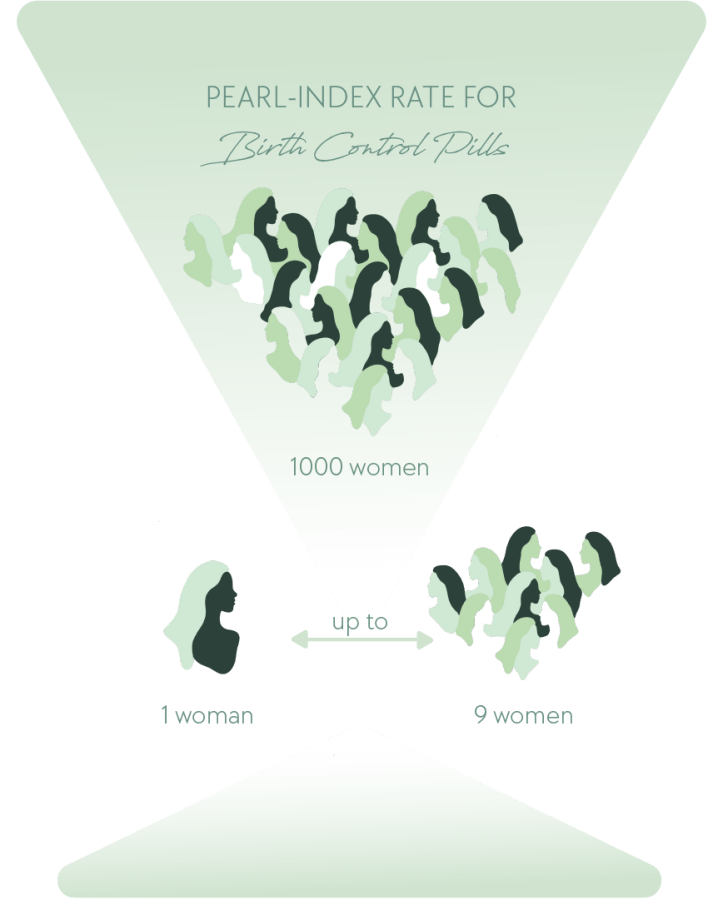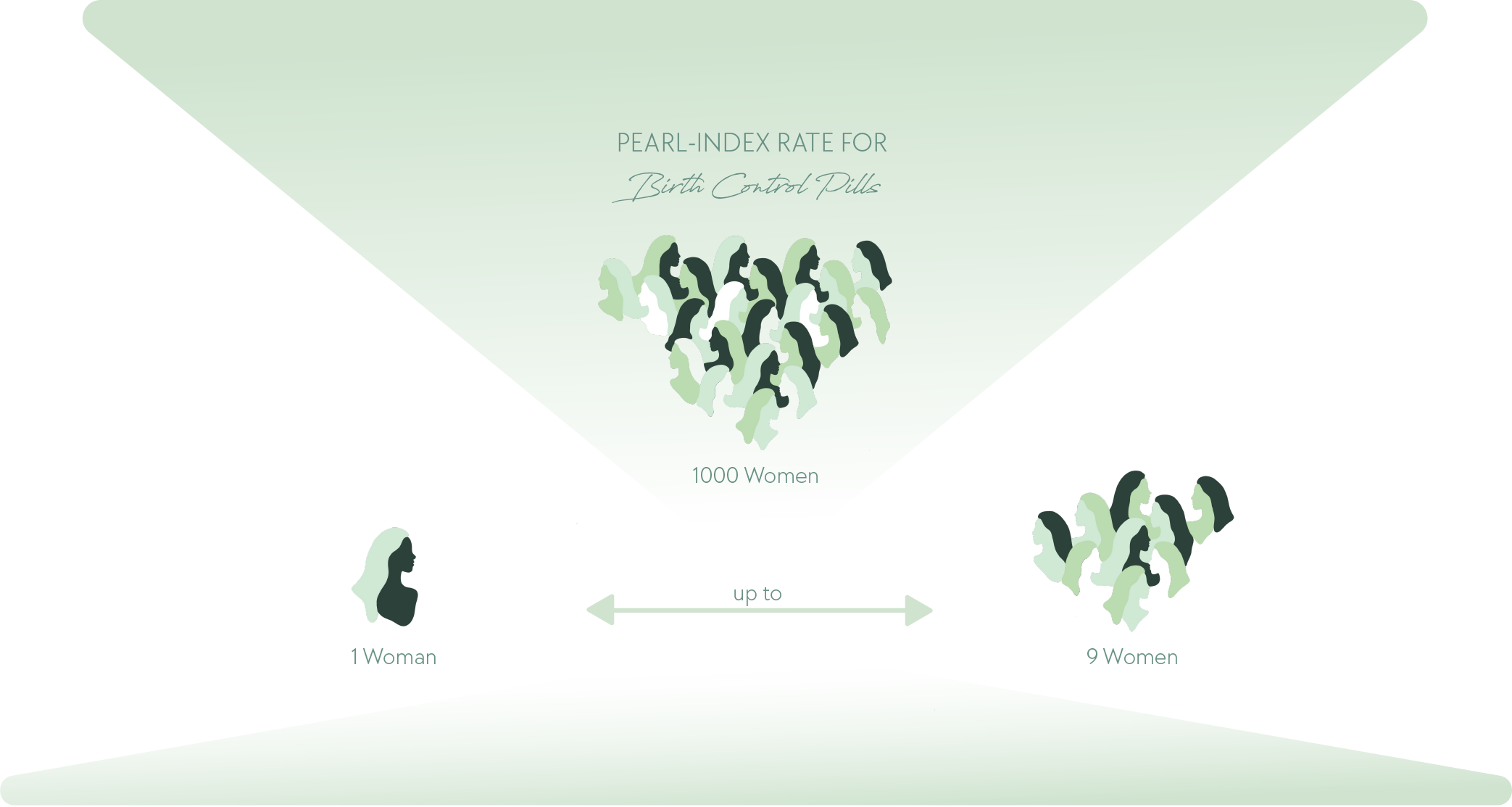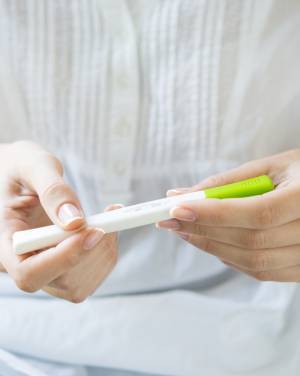Why Can You Get Pregnant While on Birth Control?
- The most common reasons for getting pregnant while taking the pill are errors in use and defects in manufacture.
- Pregnancy can occur during the placebo phase, even while using dual contraception.
Continue reading to find out causes and probabilities.
Try:
🤰🏾"Am I pregnant?" — Take the Online Pregnancy Test
👤 How does your personality type affect your pregnancy? Take the Personality Test!
Can you get pregnant on birth control?
A pregnancy despite oral contraceptives is more likely when the effectiveness of the pill has been compromised.
Even perfect use does not guarantee 100% protection. The Pearl-Index rate for birth control pills is 0.1–0.9.
Usually, its potency is diminished by errors in use, skipping a dose, counteractions with other medications, or vomiting/diarrhea.
At a Glance: Probability and Causes
The following distinction is important while determining the probability of a pregnancy despite taking oral contraceptives:
- Have I taken the oral contraceptive correctly? (i.e. perfect use)
- Or have I taken the pill more casually, missing a dose every once in a while? (i.e. typical use)
ℹ️ Note: Pregnancies can occur in both cases, but with differing probability rates:
| PERFECT USE | TYPICAL USE | |
|---|---|---|
Probability of Pregnancy | Pearl Index: 0.1–0.9 (less than 1 in 100 women per year) | Failure rate due to incorrect use: Close to 9 (9 in 100 women per year) |
Causes of Pregnancy | Defective product |
|
Pregnancy Despite Perfect Use of Oral Contraceptives
The Pearl Index describes the effectiveness of each contraceptive method. The index for oral contraceptives when used perfectly is 0.1–0.9. This means that 1–9 of 1000 women using this method for one year become pregnant. Fluctuations are due to the variations in oral birth control products.
No medication is 100% effective. In rare cases, they may even fail when taken correctly.
Pearl-Index Rate for Birth Control Pills: An Overview


Pregnancy with Typical Use
Taking a medication flawlessly over a long period of time and on a daily basis is not easily done. Therefore, researchers compare the theoretically perfect use of oral contraceptives with its typical use. This explains why the actual chances of getting pregnant while on birth control are much higher than expected.
This diminished reliability of oral contraceptives is a result of human limitations.
- Forgetfulness: Missing a dose can happen for all kinds of reasons: a vacation, a party, or another special occasion. Taking the pill at the wrong time may also reduce its effectiveness. Forgetting to take your birth control pill one single time could result in an unintended pregnancy.
- Illnesses: Oral contraceptives may lose their effectiveness during gastrointestinal infections, because the pill’s active ingredient may not be absorbed properly by the digestive tract.
- Interactions with other medications: Taking other medications can disrupt your system, causing you to become pregnant while on the contraceptive pill. The main culprits are antibiotics, but many other drugs are also known to affect the pill’s absorption.
These many human variables which are largely unavoidable increase the probability of a pregnancy, despite being on oral contraceptives. Taking it in a typical manner creates a likelihood rate of 9 on the Pearl Index; annually, 9 in 100 women become pregnant while being on birth control — every eleventh woman.
Pregnant During the Placebo Week?
Is it possible to become pregnant during the placebo week while experiencing withdrawal bleeding? Yes, this is not out of the question — but the likelihood is not greater than at any other point of the menstrual cycle.
There is an inherent risk of conception despite being on birth control no matter what point of the cycle you are at. The risk of getting pregnant during the placebo week is equal to the risk of conceiving after the placebo week is completed, or after withdrawal bleeding has ceased.
Pregnant with Dual Contraception?
You used dual contraception, but still have a positive pregnancy test? Is it possible to become pregnant on condoms and the pill? Yes, you can get pregnant while using dual contraception, birth control pill and condoms. Of course, using both methods simultaneously lowers the overall risk of conception.
The Pearl Index for using condoms as the sole means of contraception is significantly higher than that of birth control pills: namely 2-12. The article Pregnancy with Condom will provide you with more detailed information on causes and probabilities.
By consulting the Pearl Index, it becomes obvious that neither of the two contraceptive methods guarantees 100% protection. If the contraceptive pill is taken incorrectly, ovulation may occur, making conception possible. Having intercourse with a damaged condom could then lead to an unintended pregnancy, in spite of all precautions.
Am I Pregnant on the Pill?
Are you experiencing symptoms of pregnancy? That would be unnerving — you were fairly certain that you could not get pregnant while on birth control. Here are some pointers on how to deal with the uncertainty:
1. Remember: Experiencing typical pregnancy symptoms does not necessarily mean you are pregnant. Some side effects of birth control pills mimic signs of pregnancy. Even the absence of monthly bleeding could be linked to your medication rather than to pregnancy. Knowing is half the battle — consider taking a home pregnancy test.
2. If you would rather not consult your doctor or take a home pregnancy test at this time, take advantage of our Online Pregnancy Test! Check off your symptoms in a multiple-choice format and receive an immediate evaluation.
-
Am I Pregnant?
Analyze Your Symptoms
3. Take a deep breath! Even if you are pregnant, there is no need to rush things. You probably still have time before any decision has to be made. Take it one step at a time!
Unplanned Pregnancy on Birth Control — Now What?
Do you already have a positive pregnancy test — even though you had been on birth control?
This would come as a complete surprise, making you feel like you have lost all solid ground from under your feet. Here are a few thoughts on where to go from here:
- ⏳ Give yourself time! In retrospect, many women realize that taking the time they needed was the most helpful element in making a good decision — one not rushed by the initial shock. You probably still have ample time left. Find out your legal cut-off date for where you live!
- 👥 It may be helpful to share your thoughts and feelings with someone to help deal with the confusion. Who could take this kind of support role in your life?
- You may not be ready to tell anyone yet but would still like some guidance. Take advantage of our judgment-free resources:
- ⛑ Where do I go from here? — Quick Answers Quiz
- 💪 Feeling unsure? Take the Strengths Finder Test!
- 🍷🚬 Did you consume tobacco, drugs, or alcohol before finding out about the pregnancy? Take the Tox Test!









